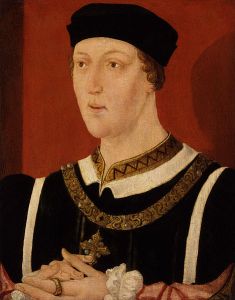 On this day in 1422 Henry VI became King of England, he was only nine months old. Less than two months later he was also proclaimed King of France. That’s a lot of responsibility before you’re even one year old. Henry was the youngest king ever to sit on the English throne.
On this day in 1422 Henry VI became King of England, he was only nine months old. Less than two months later he was also proclaimed King of France. That’s a lot of responsibility before you’re even one year old. Henry was the youngest king ever to sit on the English throne.
Henry had never even seen his father, King Henry V, who died in France whilst fighting a battle there. Perhaps from dysentery, perhaps from something called toxic megacolon, which sounds so awful I haven’t even looked it up. So how did young Henry come to be king of a country at war with his father? It’s quite complex and, unsurprisingly, didn’t work out too well. A substantial part of western Europe was going through a period of serious unrest which is now called the Hundred Years War. At the time Henry VI became king the inaptly named Hundred Years War had been raging for eighty-five years and still had another thirty-one years to go. Much of it involved a long running dispute over who should rule France.
In order to achieve what was meant to be a final state of peace, in 1420, King Charles VI of France had signed a treaty which made Henry V of England his heir. This is a bit weird because Charles VI had a son of his own who could inherit his throne. I’ve already mentioned, when I wrote about the Glass Delusion a few days ago that Charles VI was a bit odd, but perhaps he had his reasons. He claimed that his son was illegitimate and disinherited him in favour of his daughter Catherine de Valois, who he then married to Henry V.
In October of the same year that tiny Henry VI became king of England, his grandfather Charles VI also died, making him king of France too. Maybe if Henry had been older things might have worked out. But his grandfather’s disinherited son, also called Charles, claimed he was the rightful King of France and there was just even more fighting. Then in 1429 his Uncle Charles, largely due to Joan of Arc, was crowned King of France. In retaliation, Henry was crowned King of England and France and then travelled across the channel to be crowned again in Paris. Both ceremonies were carried out by the Bishop of Winchester, which didn’t go down too favourably in Paris, especially as Henry left almost immediately afterwards. As far as I can make out the main complaints were that the bishop insisted on singing a very long mass and that they brought all their own food with the, which wasn’t very nice. Poor Henry. He wasn’t terribly interested in wars and may have suffered from some of the same mental problems that afflicted his grandfather. He was deposed twice during his reign and died in the Tower of London in 1471, either of melancholy or something more sinister.
He was venerated by his supporters after his death and miracles were claimed in his name. He also left a more tangible legacy, he was responsible for founding Eton College, King’s College Cambridge and All Souls College, Oxford.